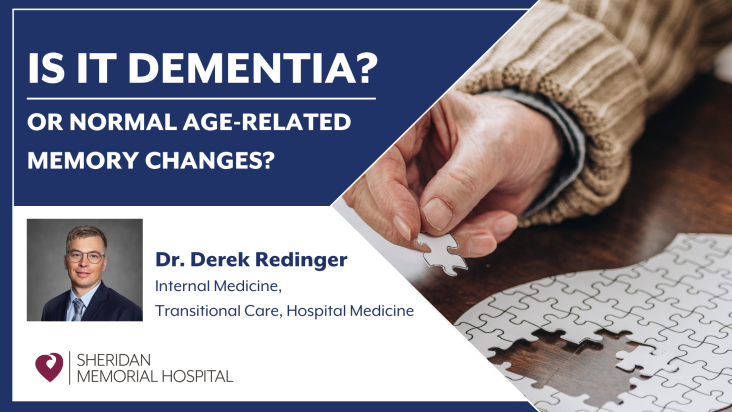Is it dementia?
By Derek Redinger, DO, Internal Medicine physician at Sheridan Memorial Hospital
Dementia is a prevalent disorder of the brain affecting a wide array of individuals, but the prevalence increases with the number of birthdays we have. Decline in cognitive function defines dementia but depending on the timing, the disorder can also be associated with a number of other effects including physical and behavioral changes.
There are a number of different causes of dementia but the most common cause is something called Alzheimer’s dementia. A few others include vascular dementia, frontotemporal dementia, dementia with Lewy bodies and a number of much less common causes such as progressive supranuclear palsy, Huntington’s disease, multisystem atrophy and cortical basilar degeneration. Vascular dementia is caused by disease of the small vessels in the brain. Frontotemporal dementia affects the frontal and temporal lobes of the brain and can be associated with prominent mood and behavior changes, which may be characterized by changes even in personality.
Alzheimer’s disease is the most common cause for dementia. Alzheimer’s disease is unusual before the age of 60 and typically occurs in those older than that. The prevalence doubles every five years after the age of 65. Alzheimer’s is defined by changes in memory with other executive function and judgment/problem solving changes tagging along. It can also mean some changes in mood and personality, especially in the middle and late phases of the disease.
In order to diagnose dementia, the most common tools include labs and imaging such as CT scan or MRI as well as a neuropsychological evaluation. Frequently, family members and those close to the individual experiencing the cognitive decline are first to identify the signs and symptoms. These changes are different from normal age-related memory changes, which involve a decline in recall especially for proper nouns such as names and names of places. Caretakers and family members should keep an eye out for difficulty doing complex tasks that a person was previously able to perform. Tasks that take multiple steps and planning can be the first affected, such as balancing the checkbook. Other ways that dementia can affect a person is difficult learning new information, difficulty with reasoning or coping with unexpected change, difficulty with spatial orientation, difficulty finding words and changes in behavior.
Ultimately, prevention is much more effective than treatment after the disease has developed, as our treatments are quite limited. The best thing we can do to prevent dementia is to keep medical problems such as high blood pressure, diabetes and kidney disease well controlled and do what mom and dad always told us: eat our fruits and veggies and exercise. As we age, exercise can move down the priority list but it is very important and is also important for reducing risk for dementia. Both mental and physical exercise are important for the aging brain. It is also helpful to have strong social and interpersonal relationships as part of an engaged and happy life.
Dementia is a scary diagnosis but is also something we can all learn to live with. Most everyone has been touched by dementia in some way and family members and caretakers end up taking on a large role; their efforts should be acknowledged and commended, as it is not always an easy adjustment.
Dr. Derek Redinger is a physician with the Internal Medicine team at Sheridan Memorial Hospital. Getting routine preventive care can help you stay well and catch problems early. Check out our Primary Care and Internal Medicine clinics if you or your loved one are in need of a have a primary care provider.

